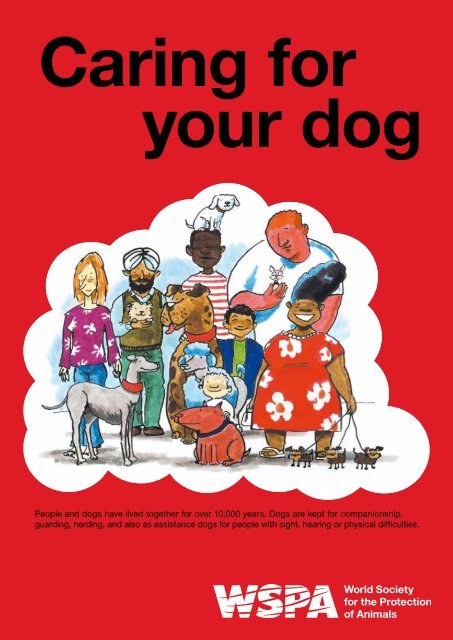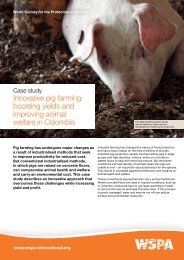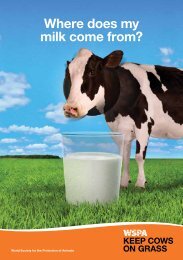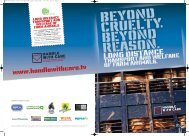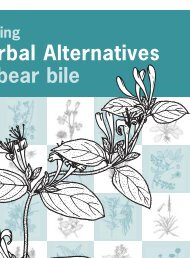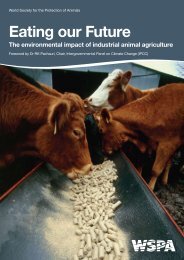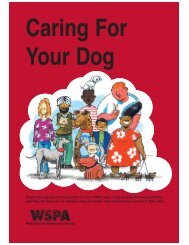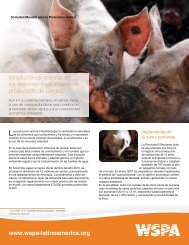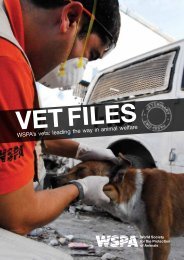Caring for Your Dog - WSPA
Caring for Your Dog - WSPA
Caring for Your Dog - WSPA
- No tags were found...
You also want an ePaper? Increase the reach of your titles
YUMPU automatically turns print PDFs into web optimized ePapers that Google loves.
<strong>Caring</strong> <strong>for</strong><br />
your dog<br />
People and dogs have lived together <strong>for</strong> over 10,000 years. <strong>Dog</strong>s are kept <strong>for</strong> companionship,<br />
guarding, herding, and also as assistance dogs <strong>for</strong> people with sight, hearing or physical difficulties.
How to care <strong>for</strong> your dog<br />
In order to stay healthy and happy, a dog needs:<br />
• a balanced diet • veterinary care • exercise • a bed with a clean blanket<br />
• to be groomed regularly, especially if they have long hair • to be trained<br />
• to be registered if available • to be looked after if you go on holiday<br />
• companionship – dogs are social animals and will be unhappy if left alone<br />
<strong>for</strong> long periods of time.<br />
Where your dog lives<br />
• A dog that lives outside needs a shelter to give protection from hot or cold weather.<br />
• A dog needs com<strong>for</strong>table and clean bedding.<br />
• If your dog has to be tethered, use a long running line (pictured above). Fixed chains<br />
or rope can become tangled around the dog causing injury.<br />
• A dog should wear a collar with an identity tag in case of escape.<br />
Food and water<br />
• A dog needs a balanced diet. Household scraps<br />
will not be sufficient to maintain good body<br />
weight or strong muscles.<br />
• Sharp bones can be dangerous, as they may become<br />
stuck in the throat or cause problems if swallowed.<br />
• Fresh water should always be available in a clean bowl.<br />
Exercise<br />
• A dog should not be permanently tied up: dogs need regular<br />
exercise to prevent boredom, obesity and over-grown claws.<br />
• A walk each day, and perhaps a game with a stick or ball,<br />
will help to keep your dog alert and active.<br />
• A bored dog may bark excessively, annoying neighbours.<br />
Hygiene<br />
• A dog that is kept in dirty conditions can become infested<br />
with worms, ticks, fleas or lice. Ask your vet <strong>for</strong> advice.<br />
• Keep your dog and the dog’s living area clean.
Vaccinations<br />
• <strong>Dog</strong>s are vulnerable to many diseases (e.g. rabies) that can also be dangerous to humans.<br />
• Vaccination helps prevent illness and reduces the risk of infection<br />
to other dogs.<br />
• <strong>Dog</strong>s need regular de-worming.<br />
Grooming<br />
• Regular brushing helps to keep your dog’s coat clean and free<br />
of tangles and provides an opportunity to check <strong>for</strong> parasites.<br />
• Grooming helps to get your dog used to being handled.<br />
Breeding<br />
• Every year hundreds of thousands of dogs are destroyed because<br />
there are not enough suitable homes.<br />
• Female dogs can produce many puppies every year.<br />
In six years a pair of dogs and their offspring can<br />
produce 67,000 puppies.<br />
• By constantly producing and rearing puppies, the health<br />
of a female dog can suffer.<br />
• Pregnant and lactating female dogs need extra food.<br />
• Puppies generally suckle from their mothers <strong>for</strong> about<br />
three weeks, gradually starting to eat additional food.<br />
• A female dog is naturally protective<br />
of her young and can be aggressive<br />
at this time. A quiet place should be<br />
provided <strong>for</strong> them.<br />
• Puppies should stay with their mother<br />
until they are at least eight weeks old.<br />
• To prevent unwanted puppies, have your dog<br />
spayed/neutered – an operation per<strong>for</strong>med by a vet.<br />
Spaying/neutering<br />
• Modern veterinary equipment and drugs make surgery safe and recovery quick.<br />
• Ask your vet when to have your dog spayed/neutered.<br />
• <strong>Your</strong> dog does not need to have a litter be<strong>for</strong>e she is spayed.<br />
• Early age neutering from eight weeks of age is now accepted<br />
as a positive action.<br />
• Once a female dog has been neutered she will never come<br />
into season again and male dogs will not bother her.<br />
• In a female, spaying can reduce the risk<br />
of mammary tumours.<br />
• In a male, neutering can help to<br />
reduce aggression and roaming.
Consult your vet<br />
Remember your vet can advise you on:<br />
• the type/breed of dog that would best<br />
suit your life style and expectations<br />
• diet<br />
• training your dog<br />
• treatment against parasites<br />
• vaccination<br />
• spaying/neutering<br />
• any other health concerns.<br />
The World Society <strong>for</strong> the Protection of Animals (<strong>WSPA</strong>) is the world’s largest alliance of animal<br />
welfare organisations. Through partnership with hundreds of member societies we strive to<br />
create a world where animal welfare matters and animal cruelty ends. We bring about change<br />
at both grass roots and governmental levels, to benefit animals. We support and develop<br />
high-profile campaigns, scientifically-backed projects and innovative education initiatives.<br />
With our member societies, governments and international agencies, we also respond to<br />
animals in communities affected by disasters.<br />
Local Contact<br />
89 Albert Embankment, London SE1 7TP, UK.<br />
Tel: +44 (0)20 7587 5000 Fax: +44 (0)20 7587 5057<br />
E-mail: wspa@wspa-international.org<br />
www.wspa-international.org


